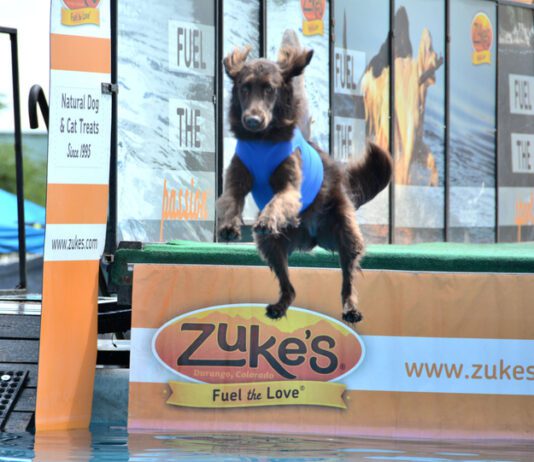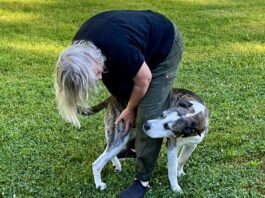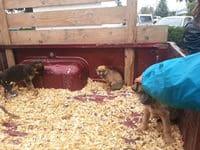Illegal Roadside Puppy Selling, Part 2
So, a couple of weeks ago I wrote about going to the grocery store late one Sunday evening and being completely bummed about a couple who was selling puppies (who looked too young, and not well cared for) in front of the market. I thought about all the things I should do and say at that time – though at the time, I did nothing. I was too tired and hungry and it was rainy and late . . . But the memory of those chilled puppies, numbed by the intake of too much stimulation, has stayed with me.
What do you do when you hear “that” sound?
“Urp. Urp. Urp.” You know, the sound that tells you your dog is just about to vomit. It sure gets your attention. And calls for action. But do you take it?
The Pagan Dog Funeral by Cynthia McCollum
Sunday evening there is a knock at my door. It's the neighbor across the street and a glance out the window shows that she is disheveled and crying. When I open the door, she bursts into fresh tears. Her dog has died, in front of the whole family eating their dinner. Poor woman is crumbling and weeps, “I don't know what to do". I take her by the hand and say let's go home and take care of things. I lead her to her house and see yes, the dog is indeed dead there on the floor of the silent, seemingly deserted house. Yellow haired Lab-mix, she has peed a bit in her dying. She is stiffening but still warm. Where are your children, I ask. She has sent them to their room. I sigh. Here is my task. I look her in the eye. Get them. She hesitates. Get them, this is sad, but not horrifying. This is a lesson for them about death. Keeping them away will make them more afraid. Let them say goodbye to her.
Oh No – Don’t Swallow That!
My Ella is a chow hound. Not only does she eat everything I offer her, including lemon slices, but she thinks the purpose of walks is to see how much food she can find. It's amazing what she comes up with. In the first year and a half that I had her, we spent one night at the emergency vet after she ingested paintballs, and she also had to see a specialist to remove a peanut fragment that she tried to cough up but which got caught above her soft palette in the back of her nose instead. I mention this so that maybe you'll understand why I panicked when the cap from a container holding a fly paper strip disappeared after I dropped it. I didn't think much of it at the time, just finished putting the strip up, and then looked around to pick up the cap, which I had heard fall, but it was nowhere to be found. I wouldn't have been overly concerned, except that the top had a thumbtack pushed through it for hanging the strip.
Breed Profiling
I’ve liked individual dogs of pretty much every breed at some point or another. But there are times when I’ve also NOT liked dogs of some breed when it wasn’t even warranted. I guess you’d call it profiling or discrimination. For the October issue of WDJ, I needed a dog to model a number of no-pull harnesses, so I could photograph them before sending them to WDJ Training Editor Pat Miller to review them. I purchased a size “medium” in all the harnesses so that Pat would stand the best chance of finding dogs to wear and try out the products. But for the photographs, I had additional requirements of the models: they also had to be a light color and short-haired, so the harnesses could be seen easily.
Do Animals Have Free Will and “Personal Responsibility” for Their Actions?
Ages ago, I edited a horse magazine, and for a time, published a column written by the noted animal communicator Penelope Smith. I really enjoyed the opportunity to talk to Smith each month, and as we discussed the column, we’d sometimes veer off into a talk about a general topic having to do with animals and our relationships with them. Despite my preconceptions of someone who purports to “talk to the animals” as being nutty, I found Smith to be incredibly insightful, wise, and humorous. She was empathetic and yet practical. I bought several of her books on “interspecies communication” and was fascinated by her accounts of experiences with hundreds of animals.
Tattoo You!
Volunteering at my local shelter this past weekend, I was photographing a cute senior Chihuahua (in an effort to better represent him on the shelter website) when I noticed something on his tummy. At first I thought it was discolored for a health reason. But when another volunteer and I rolled him over for a closer look, I could see that he was tattooed. As we stretched him in such a way to reveal the whole tattoo, I was in the process of telling my fellow volunteer that this was once a common practice – that before identification microchips became common, dogs were sometimes tattooed with the owner’s driver’s license number or phone number. But then we decoded the message. It looked like this...
One of My Proudest Accomplishments
If I had to pick which training accomplishment I am most proud of with my dog Otto, I’d have to consider a few. He’s got a rock-solid, enthusiastic recall that I love. When we’re out on the trail and he sees a duck and ducklings on the shore of the river, say, or hears a deer crashing through the brush away from us, this recall -- combined with a strong “Off!” (a.k.a. “Leave it!”) – never fails to bring admiration from my walking partners. (And because I reward him so richly for this, with a veritable avalanche of tasty treats, it stays nice and strong.)
Foxtails are a West Coast Danger to Dogs
A friend called one day to complain about his dog’s latest vet bill: $300 to remove a foxtail that the dog sniffed up his nose on that morning’s walk. If you live on the west coast, you are likely cringing with recognition of the problem. If you live on the east coast, chances are you have no idea of what I’m talking about. Hordeum jubatum (informally called “foxtail barley” but infamous as “foxtail grass”) is a perennial plant species in the grass family Poaceae. It grows like, well, a pestilent, abundant weed all over California. When the grass is green in the spring, it’s pretty; it produces these lush heads that resemble a finer version or wheat or barley. But the moment the plants start to dry in the later part of the spring, the heads start to fall apart – and each tiny segment of the luxuriant heads becomes a danger to any dog who goes near it.
Listening to Your Dog
Duncan wakes me this morning as he usually does: with a jump onto the bed and a cool damp nose gently touching my cheek. I respond as I usually do: “Okay, give me a minute.” I wrestle to open my still sleep-induced eyes and start to get out of bed. I glance at the clock – because that’s what morning does – makes one acutely aware of time. But wait! It’s only 1:28! I tell Duncan, “No way!” and pull the covers back up. He seems to accept this and goes back to sleep himself. Duncan is a 10-year-old rangy 60-pound B&W Border Collie. We’ve known each other since he was 5 1/2 weeks old. I think I know him pretty well, but that doesn’t mean I’ve stopped listening to him.
Homemade Dog Food Diets Don’t Require an Analysis
For the past few months, I’ve been writing critiques of home-prepared diets for the Whole Dog Journal. My original intention was simply to review the diets and offer comments about what they might be missing or how they could be improved, but I ended up doing a full nutritional analysis of each diet to try to figure out why the dogs eating these diets were having problems, or to better understand a very complex diet. My goal was two-fold: to find out how each diet compared to National Research Council (NRC) guidelines, which would be helpful to those experienced in feeding a homemade diet, and to help newbies get started with the recipes provided.
Evacuation Plan
If you woke up in the middle of the night and your house was on fire, could you escape with your dogs? I read the above news story and have to admire the man who thought quickly and was able to throw a mattress out his bedroom window – on the second story of his home – and then throw his dog, a hefty-looking adult Labrador, onto the mattress. Only then did he jump onto the mattress to escape. Both man and dog suffered some soreness but were otherwise okay.










